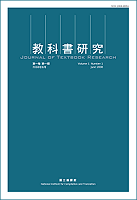|
Volume 7 Number 2
Editors: Hsiao-Lan Chen Der-Long Fang
|

|
|
|
|
|
|
|
Articles
Abstract | PDF Full Text | How to Cite
An inquiry into the development of elementary school social studies textbooks before the rescinding of martial law in Taiwan using the oral history of Mr. Ping-Chun Tu
Abstract
Taiwan’s textbooks researchers were accustomed to using text analysis methods in content analysis, but seldom focused on history. Therefore, the complexity of the textbook development process, interwoven with social context, academic trends, and interpersonal activities as it was, was rarely explained. This study employs oral narration in an attempt to obtain data which could not be realized using text analysis. We strive to better understand the experience of key individuals and their work in textbook development and how the official knowledge was formed through interviews of these persons. This paper aims to explore the development process of elementary school social studies textbooks when Taiwan was under martial law and the curriculum view in the textbooks using the oral history of Mr. Ping-Chun Tu, one of the main textbook authors during the period. Based on his oral history and with reference to relevant documents and literature, questions can be divided into three phases for discussion: 1952-1962, 1962-1979, and 1979-1988. The main conclusions are: (1) Social studies textbooks before the cancelling of Martial Law featured the purpose of social adaptation and a type of disciplinary curriculum structure; (2) the textbooks were the product of personal erudition and national ideology.
APA Format
Chou, S.-C., & Chang, W.-C. (2014). An inquiry into the development of elementary school social studies textbooks before the rescinding of martial law in Taiwan using the oral history of Mr. Ping-Chun Tu. Journal of Textbook Research, 7(2), 1-32.
|
|
|
Abstract | PDF Full Text | How to Cite
An exploration of the mechanism of national curriculum development for secondary vocational education in the Netherlands
Abstract
The performance of the Netherlands’ vocational education has been impressive and become an object of study in England. As far as the social context in policy learning is concerned, the educational policies, curriculum development, and the establishment and implementation of supporting systems are worthy of study during the educational reforms in Taiwan. This article, therefore, approaches the issues through literature exploration to better understand the content and its relationship to the overall educational structure in the Netherlands, the development and current status of secondary vocational education, ideas and approaches for the development of secondary vocational education curriculum, organizations and procedures for curriculum outlines, and supporting systems for curriculum implementation. Ultimately, this article arrives at the following five conclusions: National curriculums are developed by standing authorities which ensure the quality level of curriculum. National curriculum of lower secondary vocational education should possess the commonalities of curriculum objectives, which intend to cultivate common and basic abilities. The category of vocational clustering of national curriculum in upper secondary education is characterized by flexibility and adaptability. National curriculum in upper secondary education should possess abilities of destination detection and emphasize merits of competency-based curriculum. And the supporting system for national curriculums facilitates curriculum implementation.
APA Format
Tseng, P.-K., Hsu, H.-G., & Sung, H.-T. (2014). An exploration of the mechanism of national curriculum development for secondary vocational education in the Netherlands. Journal of Textbook Research, 7(2), 33-72.
|
|
|
Abstract | PDF Full Text | How to Cite
A study on textbook design and development: A case study of Tokyo Shoseki social studies textbooks
Abstract
This study explores the process of social studies textbook design and development by Tokyo Shoseki. A prototype is proposed for this study based on textbook design and development in Taiwan and literature review. Data was collected using semi-structured interviews of authors, editors, and representatives of collaborating companies as well as using document analysis. The research aims are (1) to depict the process of textbook design, i.e., curriculum design, teaching design, text design, layout design, and graph design; (2) to explore the process of textbook development and its influence on textbook design; (3) to construct a model for textbook design and development; and (4) to reflect on textbook design and development in Taiwan and propose suggestions for reference. Based on the research findings, a dynamic model is proposed to explain the textbook design and development for Tokyo Shoseki. Six features of this model are identified comparing the prototype proposed in this study. The reflections on and suggestions of the production process of Taiwan’s social studies textbooks are proposed as the conclusion.
APA Format
Chan, P.-J., Yeh, W.-L., & Chen, L.-H. (2014). A study on textbook design and development: A case study of Tokyo Shoseki social studies textbooks. Journal of Textbook Research, 7(2), 73-116.
|
|
|
Textbook Review
PDF Full Text | How to Cite
APA Format
Chiu, C.-H. (2014). Textbook review: An introduction and review of Tokyo Shoseki publishing’s life environment studies textbooks. Journal of Textbook Research, 7(2), 117-135.
|
|
|
Book Review
PDF Full Text | How to Cite
APA Format
Yang, J.-Y. (2014). Review of the book The development of elementary school textbooks: A museum on paper, by C. Sih. Journal of Textbook Research, 7(2), 137-144.
|
|
|
Manuscripts and all editorial correspondence should be sent to:
4F, 179 Sec. 1, Heping E. Rd., Daan Dist., Taipei City 106011, Taiwan (R.O.C.)
E-mail:
ej@mail.naer.edu.tw










